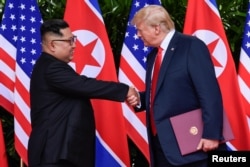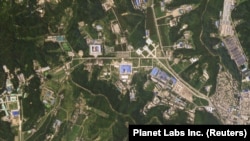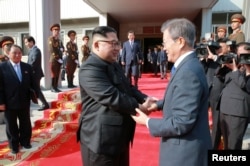Increasing economic and political pressure could revive tensions with North Korea in the coming months, unless significant denuclearization progress is made.
“This calm that we are seeing right now is not exactly sustainable,” said Go Myong-Hyun, a North Korea analyst with the Asan Institute For Policy Studies in Seoul.
North Korea’s diplomatic pivot this year to suspend provocative nuclear and missile tests helped ease tensions in the region, and produced a major diplomatic breakthrough when North Korean leader Kim Jong Un promised to work toward denuclearization when he met with South Korean President Moon Jae-in at the inter-Korean Summit in April, and again with U.S. President Donald Trump at the Singapore Summit in June.
While the Trump administration has said there is “no time limit” for implementing the North Korea nuclear agreement, there is growing concern that the U.S., North Korea and even South Korea could soon shift back toward more confrontational policies if diplomacy falters.
Looming U.S. Elections
President Trump’s expressed optimism that the North Korean leader would live up to the broad denuclearization commitment he made has not produced any concrete results. Subsequent talks in July between Washington and Pyongyang ended with the two sides holding fundamentally opposing views over how to proceed.
The U.S. has called on North Korea to unilaterally dismantle its extensive nuclear and ballistic missile arsenals before concessions are granted. The Kim government wants upfront easing of sanctions, a peace treaty, and a gradual reduction process that could leave North Korea a de facto nuclear state for the indefinite future.
On Tuesday John Bolton, the White House national security adviser, criticized Pyongyang saying he wants to hear less rhetoric about denuclearization and see more performance. And he said the relaxation of any sanctions “was not under consideration.”
At the same time that diplomatic talks seem to be at a stand still, the U.S. Secretary of State Mike Pompeo said North Korea is continuing to produce fuel for nuclear bombs, and U.S. spy satellites detected renewed activity at a North Korean intercontinental ballistic missile site.
If there are no concrete denuclearization measures taken, some analysts say, the Trump administration could move after the election in November to again increase economic sanctions and restart joint military exercises with South Korea that were recently suspended.
“After the midterm elections I think there will be renewed pressure for United States to show something in regards to North Korea’s denuclearization,” said Go.
Economic pain
Despite reports that China and Russia have eased United Nations sanctions by exporting oil to North Korea, and importing North Korean coal and workers, the North Korean economy continues to suffer.
As a result of international sanctions banning 90 percent of the country’s trade, North Korea's gross domestic product (GDP) shrank 3.5 percent last year, according to the Bank of Korea in Seoul. It was North Korea’s biggest decline since 1997 when the isolated nation was dealing with a devastating famine.
The leadership in Pyongyang wants and needs sanctions relief soon, and may be willing to make some significant concessions to get it.
“For North Korea to avoid the worst-case scenario, it is necessary to make compromises with the international community,” said Cheong Seong-chang, a North Korea analyst with the Sejong Institute in South Korea.
However few think the Kim government will give up all of its 30 or more nuclear weapons and hundreds of ballistic missiles, plus biological and chemical weapons in one grand bargain for economic relief.
Unless there is a compromise approach taken by the U.S., Pyongyang could revert to a hard line position and again start weapons testing.
South Korea
President Moon, the progressive leader of South Korea, has played a key role in facilitating talks between Washington and Pyongyang, and in encouraging North Korea to engage in denuclearization talks.
Moon’s public approval rating in South Korea soared to 80 percent when he met with Kim in April but has dropped to just over 60 percent of late, mostly over domestic and economic struggles.
But there is also a growing sense of concern in South Korea that Moon’s efforts to engage the authoritative government in the North with financial support for joint sports participation and the promise for renewed economic ties once sanctions are lifted, could be seen as appeasement if Kim does not offer a significant nuclear concession.
"Moon has got like a six to 12 month window to get something substantial out of the North Koreans before hawks in South Korea start to undercut this, the same way they undercut the Sunshine Policy,” said North Korea analyst Robert Kelly with Pusan National University in South Korea.
The Sunshine Policy, instituted by a previous progressive government in South Korea in 1998, offered unqualified economic assistance and investment to encourage the North to denuclearize. Critics say Pyongyang took the money but did not end its hostile behavior or its nuclear program.
Lee Yoon-jee contributed to this report.










